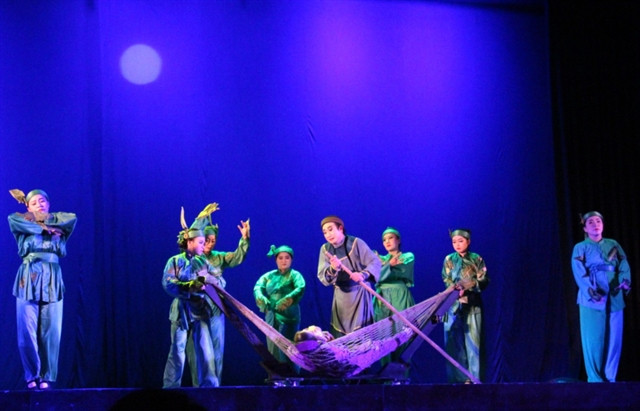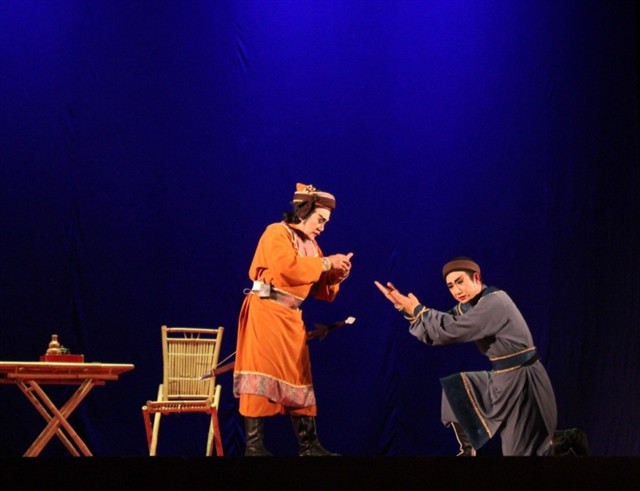 |
| REACHING KIDS: Artists from the HCM City Tuồng Theatre will perform and talk about tuồng for students in HCM City in December. — Photo courtesy of the producer |
Two new plays of tuồng (classical drama), a traditional genre of Vietnamese theatre which began a hundred years ago, will be staged at secondary schools in HCM City in December.
The performances are part of the long-term art project called Sân Khấu Học Đường (Theatre School) by the city’s Department of Culture, Sports and Tourism, in co-operation with HCM City Theatre’s Association, that targets secondary students.
The two tuồng plays, called Xuân Về Trên Đất Thăng Long (Spring Comes to Thăng Long Citadel) and Anh Hùng (Hero), are scheduled to be staged in December. They feature Vietnamese history.
Xuân Về Trên Đất Thăng Long is staged by actors of the private theatre IDECAF.
It portrays female General Bùi Thị Xuân and her husband, General Trần Quang Diệu, two national heroes who lived and served the Tây Sơn Dynasty in the late 18th century.
Gen Xuân was born in Bình Khê (now Bình Định Province). She learned martial arts when she was a child. She was reputedly a very brave and strong woman.
Xuân helped the Tây Sơn army train elephants for combat, and became known as one of the five principal women in the Tây Sơn Dynasty. She and her husband won many battles.
The Tây Sơn Dynasty (1778-1802) was founded after three Nguyễn brothers – Nguyễn Nhạc, Nguyễn Huệ and Nguyễn Lữ – from the village of Tây Sơn rebelled against the Nguyễn Lords and Trịnh Lords.
The Tây Sơn Dynasty ended the century-long war between the Trịnh and Nguyễn families, and the Lê Dynasty, and united the country for the first time in 200 years.
 |
| VIETNAMESE PATRIOT: A scene from the tuồng (classical drama) play Anh Hùng (Hero), a production about the career of national hero Nguyễn Trung Trực, who gathered local farmers to fight against the French in Tân An and Rạch Giá (now Kiên Giang Province) in 1861. — Photo courtesy of the producer |
The play Anh Hùng will be staged by the HCM City Hát Bội Theatre, one of the region’s leading State-owned traditional drama troupes.
It features the career of national hero Nguyễn Trung Trực, who gathered local farmers to fight against the French in Tân An and Rạch Giá (now Kiên Giang Province) in 1861.
Trực and his troops attacked and burned the warship L’Esperance of the French navy in Nhật Tảo Village in Tân An.
He was famous for his words, “Only when there is no grass in Việt Nam, will there be no more Vietnamese fighting against foreign invaders.”
The French killed him at Rạch Giá Market in 1868.
“We hope to encourage young generations to learn Vietnamese history and love tuồng, which is part of their heritage, after watching our live performances at school,” said the show’s director Hùng Vũ.
Vũ used a group of talented artists, including theatre stars Kiều My and Bảo Châu, to perform lead roles.
Tuồng developed from a folk art into a royal art in the 17th century. It is well-known in the Cửu Long (Mekong) River Delta provinces. It consists of singing, dancing and music, all of which are highly stylised and symbolic. — VNS